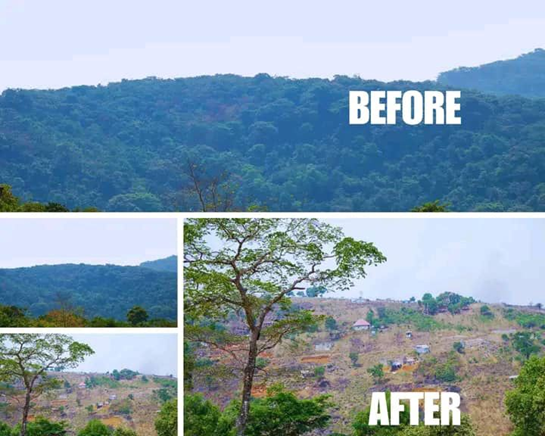By Mariama Bundu
Tacugama Chimpanzee Sanctuary stands as Sierra Leone’s premier tourism destination. For over three decades, environmental conservationist Bala Amarasekaran has dedicated himself to preserving the forest and protecting the nation’s iconic animal—the chimpanzee. His tireless efforts have made Tacugama not only a sanctuary but also a symbol of Sierra Leone’s commitment to wildlife conservation.
Renowned for its daily guided tours (10:30 a.m. and 4:00 p.m., booking required), eco-lodge accommodations featuring treehouses and roundhouses, and activities such as hiking, birdwatching, and waterfall visits, Tacugama’s mission is clear: rescue, rehabilitate, research, educate, and conserve.
However, the sanctuary now faces a severe crisis. On 26 May 2025, management announced its closure to the public due to illegal encroachment within and around the protected area. While Tacugama continues to care for its 123 chimpanzees, the surrounding forest is under threat from land grabbers and rampant deforestation.
Tacugama relies on two dams: the Congo Dam and the Tacugama Dam. Thanks to extensive afforestation efforts, the Congo Dam remains in good condition. The Tacugama Dam, however, is struggling due to deforestation and encroachment. This situation endangers not only wildlife but also the communities that depend on these water sources.
During a visit by journalists on 9 August 2025, rangers showcased both the sanctuary’s achievements and the threats it faces. Visitors saw the well-maintained Congo Dam, developed hiking trails, the under-construction Innovation Center with sports, office, and leisure facilities, a modern car park, and the future site of a 360-meter canopy walkway funded by the UNDP. Yet, illegal logging and settlements are steadily consuming the forest.
The consequences of continued encroachment are dire: loss of chimpanzee habitat, disruption of biodiversity, decline in tourism revenue, increased soil erosion, dam sedimentation, and reduced water quality for surrounding communities.
Bala Amarasekaran warns:
“In the last three to four years, encroachment and land grabbing around Tacugama have become rampant. Fires around the sanctuary could destroy our electric fences, potentially allowing 120 chimpanzees to escape and creating significant human-wildlife conflict. Everyone will blame the government if this happens.”
Tacugama attracts 500–600 visitors monthly, with Sierra Leoneans paying NLe 100 and foreign tourists NLe 300. Its closure represents a substantial economic loss for the tourism sector, halting efforts to expand to over 1,000 monthly visitors due to environmental destruction.
Countries such as Kenya, Costa Rica, Botswana, Nepal, Australia, and Rwanda prioritize wildlife and forest conservation because they understand that eco-tourism drives revenue through lodging, food, tours, transportation, and crafts, boosting employment and national income. Sierra Leone has no reason to lag behind.
Tacugama is also a national service provider. It employs nearly 50 staff onsite and engages up to 200 community members for projects. The sanctuary supports 40 schools, has constructed three secondary schools in two years (with a fourth underway), and supplies water to 21 communities in the Mountain area.
Bala emphasizes:
“This is a national interest issue. We are protecting water sources for hundreds of thousands of people. Yet the Tacugama Dam is filling with silt, dirt, and leaves because of deforestation. What is the point of building water tanks if we destroy the source?”
President Julius Maada Bio ordered the demolition of illegal structures around Tacugama, but progress has stalled. The Ministry of Tourism, Ministry of Environment, NPPA, EPA, Ministry of Lands, and Ministry of Water Resources must collaborate to enforce forest protection effectively.
Bala Amarasekaran has done his part for over three decades. Now it is up to the authorities and citizens to ensure Sierra Leone does not lose this national treasure. Without urgent action, the country risks losing its iconic chimpanzees, vital water resources, tourism revenue, and international environmental credibility.
“We cannot sit back and watch a few unpatriotic individuals destroy what belongs to the nation. We have a responsibility to our children and grandchildren to protect Tacugama—for them, for the chimps, and for the country,” Bala concludes.
Protecting Tacugama safeguards wildlife, supports communities, preserves water catchment areas, strengthens the economy, and ensures Sierra Leone’s natural heritage endures for generations to come.



